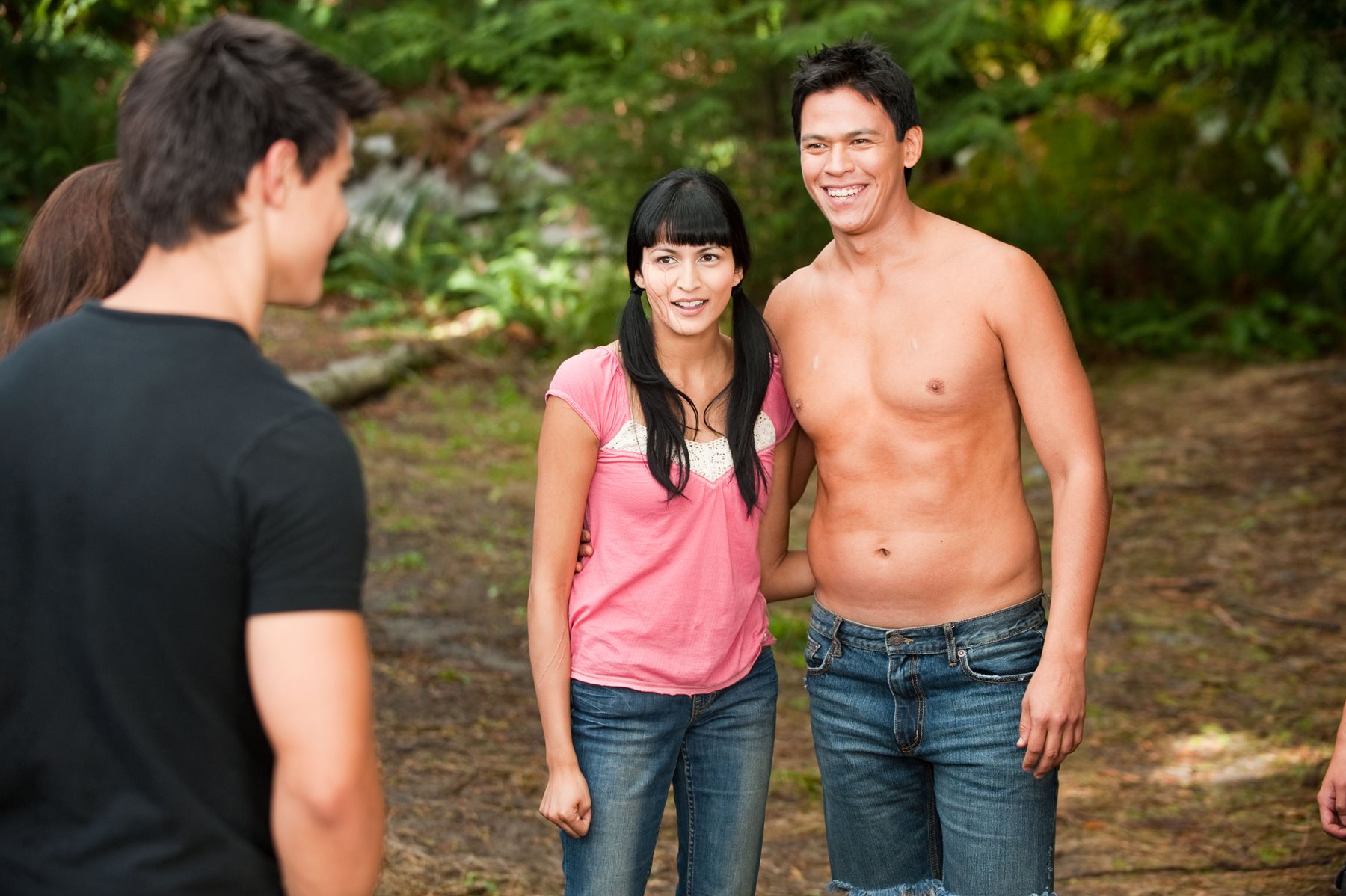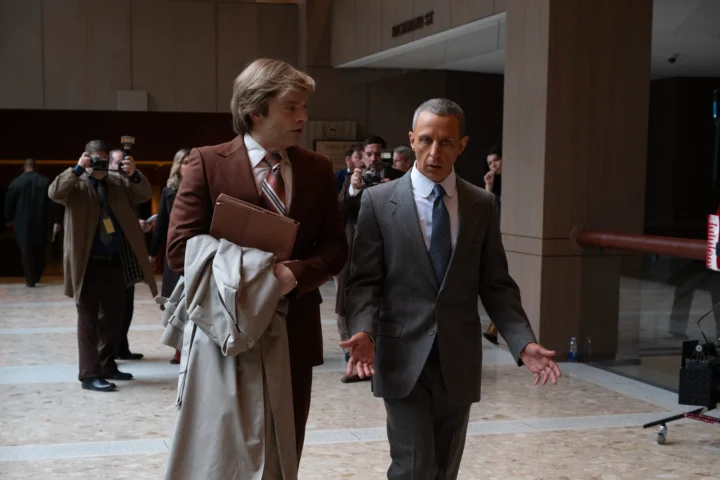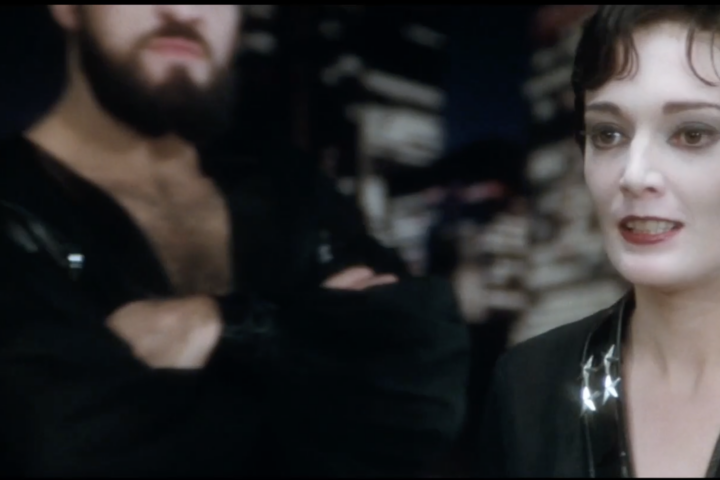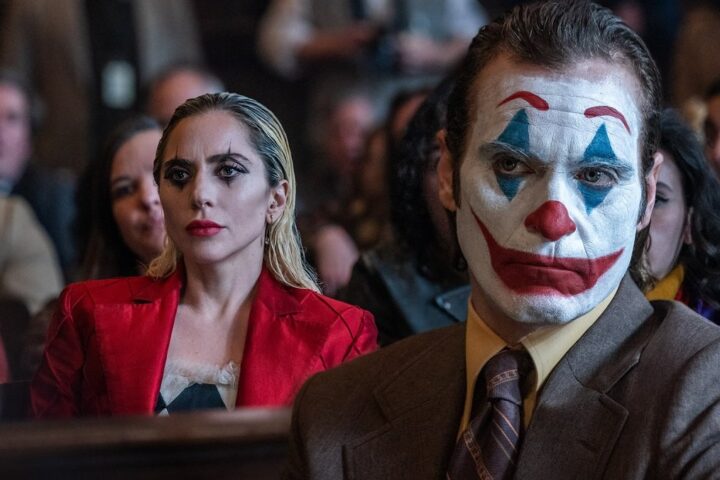As Sam Uley, the leader of The Twilight Saga’s feral—and uniformly handsome—wolf pack, actor Chaske Spencer has spent the better part of the last decade starring in one of the most popular film franchises of all time, a high-profile role requiring equal parts physique and physical. Yet there is much more to Spencer, a thoughtful and socially conscious young artist, than Twilight’s charismatic lycanthrope suggests.
During a recent stop in Chicago to discuss the home video release of The Twilight Saga: Breaking Dawn – Part 2, coming to fans with all new scenes and special features, I caught up with Spencer to discuss the phenomenon his life has been since being cast in the blockbuster series, a career-making boon that took him overnight from broke, starving New York artist to teen pin-up object, a trajectory to successful, working actor that consequently helped solidify his commitment to his Native American heritage.
When not running with the wolf pack, thirty-seven-year-old Spencer—a Lewiston, Idaho youth who accidentally discovered a love for the theater—has starred in a series of indie films and is also carefully cultivating a more-than hobby as a photographer (he’s already mounted exhibitions), his dual passion. He also recognizes the value of his celebrity and influence as a Native American actor in an industry not known for banking on leading men of color.
Now that you have come to the end of the Twilight series, what are your thoughts?
I’m okay with it. I’m not being ungrateful, but it had such a huge impact that it is healthy to take a step back. It was a great series to be a part of and it gave me a career, and I really appreciate that. I think it launched everyone’s careers and had a huge, pop culture impact.
Is it a different feeling now than when you were first hired for the job?
When I first got it I was really excited as an actor. To do a gig like this was amazing. It had a huge fan base and the franchise gave me a stepping stone to do other films. I just don’t know how to feel about it because it has changed my life. I know it was fun and I met some amazing people and had some great experiences. The fans have been amazing and dedicated to us. All that counts is that the fans love the movies and made this what it is.
It got pegged early on as a franchise for teen girls, even though many of the issues—love, family, protecting those you care for—are universal.
Yeah. It’s the oldest story in history. Boy meets girl. Then another boy meets girl. It’s the same basic formula except that one is a werewolf and one is a vampire. It’s the relationship between those characters. I like that the movies were geared toward a female audience. The Avengers and many others are geared towards boys. Some of the backlash was because it was a love story. Of course it was—it was geared toward that audience. They are the ones that made it a hit. If I was a girl and always at The Matrix with my boyfriend, like, “This is great. Keanu is hot. But what’s in it for me?” Then you get Twilight and it’s like, “Come with me. You’re going to watch this movie with me.”
And this one is more of action film as well.
Yes, I love Breaking Dawn – Part 2.
The theme is good for anybody—which is that if you find someone who can help you unlock your special abilities then the opportunities in life are limitless.
Exactly. I never understood it as a thirty-seven-year-old man! But then when I talked to the fans or my nieces or women in my life, they get it.
Let’s talk about your background. You grew up in Lewiston, Idaho, where you first set foot onstage at the Lewiston Civic Theatre. When did you know that you wanted to do this?
I wasn’t doing much in Lewiston, Idaho. I was getting in trouble. I was running out of options. I related to the character in Saturday Night Fever. I was there, but wanted out. And it was going to be some artistic endeavor; either photography or acting. I knew if I was going to be an actor then I was going to have to study. You have to go balls out. Go big or go home. I also wanted to be a photographer. When I got to New York, I made sure I started to study and take acting classes right away. I started reading a lot about the guys I liked and admired—the Sean Penns, the Val Kilmers—who were a little out there and had respect. I thought, “Well, they are from New York City. That is where they went. I am going to go there and do that.” I learned that acting was not just something that you show up to. I think a lot of people think that. Acting is not glamorous or cool. When you are really working on something you put yourself out there. It is not fun to expose yourself that way on film.
Especially when you are forty feet high.
Yes, forty feet high! So it turned me on relatively early and sparked an interest. I love being an actor. I have other interests and do other things. But I like the fact that it is like a ticket to not growing up.
It doesn’t feel like work?
It doesn’t feel like work. It can be. It’s a job. But it’s not work. When I approach a character it changes all the time. I see Daniel Day-Lewis and you hear about how his work ethic is. And you hear about Brando and De Niro and all of these different people, and each film I take on his different persona. For Twilight, it was a lot of physical stuff so the training helped out. With other films I have done, I sometimes stay in character on the set. It all depends on how you are feeling at a time when you approach a character. That constant trying to figure it out turns me on. One of my acting teachers said, “You will never figure it out. That is the process.” I love that. That is what artists and photographers do. You may never get there, but you keep trying to get better.
Let’s hear a bit about your commitment to the Native American community. And I’d like to hear your thoughts about the images of Native Americans in movies right now. I know you were in Chris Eyre’s Skins when you were younger. That was a great movie, and his Smoke Signals was as well. I don’t know why he’s not making those anymore.
I think for Native American films we are not really there in pop culture. This is the biggest pop culture event. IT has launched my career as a Native (American) actor. But getting Native films to a pop culture level is unheard of. Smoke Signals was a surprise hit and Skins didn’t do as well.
It’s a darker movie.
It’s a darker move and it hits close to home with America and the history of Native Americans in the United States. It’s one of those things that people don’t like to talk about because it is a black mark on our history. And let’s be honest—it gets down to money. Hollywood is about the bottom line: “How much is this film going to make?” Including myself in this—and there are some great Native actors out there—I don’t know who could bring that type of money needed for something like a Breaking Dawn or that type of box office. There is really not anyone out there. I can see why it’s a risk, plus it has to be written really well. It has to be not so personal that you cannot relate to it.
I have turned down a lot of things where it is the stereotype of me going, “How.” I can’t do that. I have worked hard to get here. I’m not saying those are bad and there are good friends of mine who are actors who do that, and it’s not a bad thing. But we have come so far, so why take steps back?
What do you think about Johnny Depp playing Tonto in the upcoming The Lone Ranger feature? I know you love him as an actor.
I love him! I don’t get the backlash on him. He has always said he is Native. He has been Native since 21 Jump Street. I think he is like a quarter or something. It’s rare to get a Native up there. Who else is going to bring that box office? And the respect he had to take this on, knowing he is going to get a backlash… I hate that. It’s in the Native community and I understand why—they are not up for the role. And I’m okay with that. A lot of other Native actors, we get it. He is doing a great job. I love the trailer. It’s going to be a beautiful movie. It takes an actor like Johnny Depp, who from what I hear is a cool guy. I think really good actors are open minded and they bring that to the film.
Sort of like you have to get yourself out of the way.
Yes. It does take that as an actor. You can’t think about yourself so much. I think sometimes actors are so caught up in the fear of what people think and how they will be interpreted. That is why acting is not cool. You can’t go up there and try to be cool. You have to go up there and show your ass.
So what is your “Shift the Power to the People” initiative?
I really wanted to give back to the community because I felt obligated and pretty damned grateful to land all of this. Before I got Twilight, I was broke. I was living in Brooklyn and I had quit drinking and drug use…
For financial reasons, right? That stuff is expensive!
(Laughter) Yeah! Exactly! Drugs aren’t cheap anymore! So I felt like if I ever landed something and if the acting gods smiled upon me, I would do my best to give back to the community in whatever way I could. So I talked to my manager about what I could give back. So we started this thing called Be the Shift. And it’s this idea about shifting the system to where you don’t have to go back to- well, you see a lot of stuff going on like politics in Washington, or an interpretation about how a race is being represented in pop culture, to shift that mindset or system. And you can do it in your community, whether it is taking on a water project or helping some type of community charity. But what I like about it is doing it in a way where you don’t have to go back and fix it makes sustainable change. So I go around talking to reservations about a water technology to help bring fresh water to communities and also sustainable energy. I think it can create jobs; recycled water can create electricity. And it ‘s something we’re going to have to look at in this country, because we are running out of fresh water. There is a documentary about this called Flow. And it’s something I would like to see in Native communities. People think that Natives are rich because of casinos, but there’s a lot of reservations out there that are dirt poor, like third-world-countries, which I don’t think a lot of people in the United States know about. It’s one of those things that is swept under the rug. That is why I started Be the Shift. It was about what I could do to create sustainable change. You get the feeling you are doing something good and giving back, and you also don’t have to talk about your abs all the time like with Twilight. I can use Twilight’s platform to help people shift or inspire them to do something in their community.
Is that the most cliché Twilight question you get? The physical stuff?
Yes, that and if I am Team Jacob or Team Edward. (laughter)
You wanted to be a photographer as well. And you’re still active at it.
Yeah, I still shoot. I had my first show last year and sold my first photo. I shot a lot, even before Twilight. I have a lot of photos that I could still use. But I want to keep shooting. I like rock bands. I liked interesting people who have something in their face that I want to see.
So mostly human stuff?
Yes and landscapes. I just like to shoot things, especially in New York because there is so much going on there. I take my camera on all film sets. It helps between gigs, and when I am at a gig, to get my mind off what I am doing to give me a break. I love photography. I have signed up for two more films this year and maybe between or after that I would love to go to Egypt or the Middle East and take some photos.
Do you have this feeling when you are walking around like you see the world as a photograph? Like you are always looking through a camera? I feel that way—always seeing the world as if it is a film composition; whatever is inside the frame.
I do! And it has developed. It never used to be that way until five or six years ago. Now everything is a photo. It’s automatic. I think about the light. I was taking photos of the landscape and the food when I walked in here. So it’s something that just keeps my mind off stuff. I really admire photographers. There was a documentary on HBO called Witness, where they went around and followed combat photojournalists who were witnesses. It is crazy to think that you could be in those situations and the camera is all that is protecting you. To hear their words and how they talk about being a witness to things, and capturing those moments where it is all about the right shot—I would like to do that. I don’t know if I will be able to, but at some point.
I think I take about a hundred pictures a day.
Yes! It’s weird how that develops. When I talk to people who say they want to get into photography and are serious about it, I tell them, “Wait (until) you develop and eye and start to see things everywhere.”
What is the best part about your job?
Travel. I love to travel. That is the best part. I love hotel rooms, the smell of airports, I like to see things. One time we went to Berlin doing these promotions and I had not slept in two days. I stayed up another day to hang out with my camera and I shot everything imaginable. It was from like 5-8am when no one was around. I realize it’s a cliché, but I put on U2’s Achtung Baby and I just shot and shot, some of the best stuff I have ever shot in my life. I love that. I love to travel. I don’t mind the jetlag.
You don’t post that stuff on your website though.
No, I don’t. I have maybe two photos on my website. I am supposed to have another show, and I just have to find the photos, which I already have in my head, but I have an idea for a theme I’d like to do. I don’t like shooting in a studio. I like going out there.
In natural light?
In natural light, getting it really fast. I don’t spend all day on a photo. I like the spontaneity.
One more Twilight question—about the concept of a soul mate—do you think that’s a true concept in the world, or just a romantic construct?
I think there is someone out there for someone. However their relationship may be between them. But I think if you find that someone, that person is your rock. I have known people who have been together since the first they met and are solid. But then everyone is in their own interpretation of a relationship. I think once you find that someone it is there. But relationships are hard work. Do you and that other person want to work on that relationship to make it continue? And I think that is how a lot of people stay together.
You just have to find the person.
Yes, the one who will put up with your shit. (laughter)
Special thanks to Chaske Spencer for this interview




Chaske,
I enjoy meeting you as a Native brother and enjoy the fact that you love photography and acting. (Nature is where my heart lies in photos. I love taking pix of our little Wichita Mt. Range). As an actor you have really done a great job representing the Native Americans. You keep telling your story and sending a positive outlook on the negatives that so many people struggle with and just have a hard time admitting. But you have chosen to turn that negative to help others and your Higher Power is Blessing you always.
Thank you for sharing….and keep coming back.